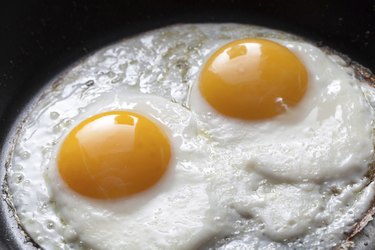
Eggs are known for their high protein content, as well as their high cholesterol content. Those with high cholesterol are advised to eat egg whites only, as they are cholesterol-free. When considering eating food raw or cooked, the main concerns are health risks and nutritional value. Some foods, such as eggs, that are consumed raw or undercooked carry the risk of getting food-borne illnesses. Other foods, such as vegetables, are healthier to eat raw because they contain more nutritional value and may lose that value when cooked.
Raw Egg Dangers
Video of the Day
Consuming raw eggs used to be a common method used by athletes and bodybuilders. As of 2010, people know better than to eat raw eggs for safety reasons. According to the Washington Post, approximately 142,000 Americans are infected with salmonella annually from infected hens that are passing the bacteria to her eggs; about 30 Americans annually die from the poisoning.
Video of the Day
Amino Acids and Protein
Amino acids, which make up protein, are the basic building blocks of the body and are needed to replace broken proteins. According to the Centers for Disease Control and Prevention, a complete source of protein is one that provides the body with all the essential amino acids needed to complete and build more protein. Animal sources, such as eggs, are considered a high-quality source of protein that provides the body with complete and essential amino acids.
Nutrients in Eggs
A large egg contains 6 grams of protein; 3 grams are found in the egg whites, with the remaining 3 grams found in the yolk. An egg contains 78 calories, and 17 of the calories are found in the egg whites. Other egg nutrients besides protein include folate, biotin, vitamin B-12, iron, zinc, sodium and calcium; most of these nutrients are found in the yolk.
Change in Protein Structure
According to Encyclopedia.com, the denaturation of protein means that the structure of protein may change when exposed to heat, acid or alkali, or bases. These external forces change the structure of the egg from a liquid form to a solid form; the denatured proteins will lose their biological action, such as enzyme function, but their nutritional value will remain the same. For example, avidin is a protein in egg whites. If you eat egg whites raw, the avidin binds with biotin and prevents it from being absorbed, but if the egg white is cooked, it denatures avididin and biotin is easily absorbed by your body. The egg will still contain 6 grams of protein after the egg is cooked; only the structure of the protein will change.
Considerations
A study published in the "Journal of Nutrition" found that consuming cooked eggs as opposed to raw eggs provided the highest rate of protein absorption and is the safest method of consumption. The study concluded that the body absorbs protein from a cooked egg at a rate of 91 percent, while raw egg protein is absorbed at a rate of 50 percent over a 24-hour period. Apparently, the denaturing of the protein resulted in the higher rate of protein absorption in the body.
- Washington Post: Overhaul of Food Safety in The Works
- Centers for Disease Control and Prevention: Protein
- Encyclopedia.com: Denaturation, Protein
- Journal Of Nutrition: Digestibility of Cooked and Raw Egg Protein in Humans as Assessed by Stable Isotope Techniques
- USDA National Nutrient Database: Eggs, Whole, Cooked, Boiled
- MedlinePlus.com: Biotin